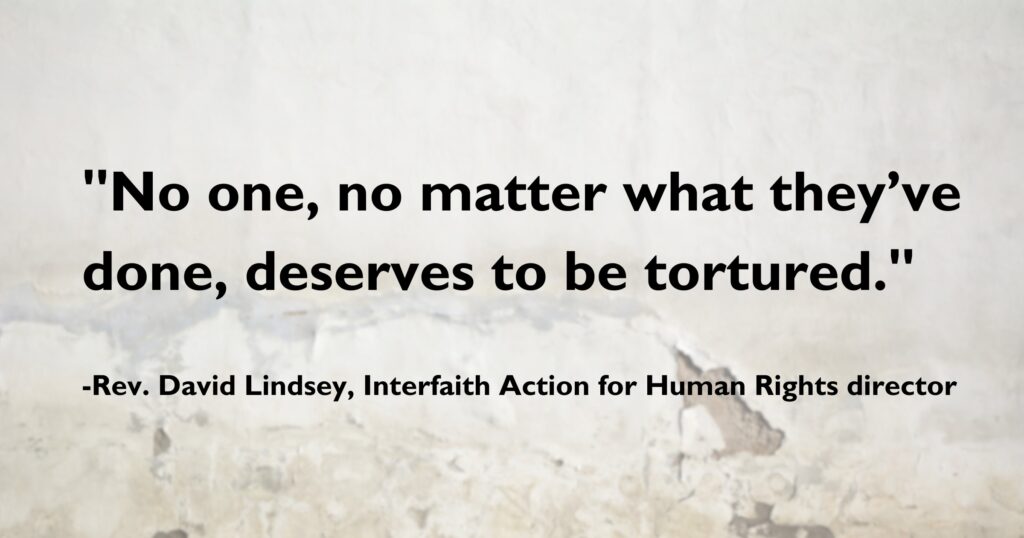Proposed resolution urges Synod to condemn solitary confinement as torture
The 2023 General Synod of the United Church of Christ will consider 17 resolutions and several bylaw changes when it meets June 30-July 4 in Indianapolis. This is one in a series of articles about them. Full texts of each of the proposed resolutions are available at the General Synod website.
A solitary confinement cell replica has been traveling around Wisconsin, offering people the opportunity to spend time inside the small space for an introduction to what solitary confinement feels like. The replica includes a bed, fake toilet and audio recording that plays sounds representing howling inmates in nearby cells.
Talib Akbar, who created the mobile exhibit, experienced solitary confinement 10 times at lengths up to nearly a year during his 20 years of incarceration. He referred to the practice as “mental torture” and credits the idea for the replica to the Rev. Jerry Hancock, director of the Prison Ministry Project based at First Congregational United Church of Christ in Madison, Wis. A similar experiential exhibit was part of the exhibit hall at the 2015 General Synod.
A proposed Resolution of Witness is now bringing this issue to delegates of the upcoming General Synod of the UCC and calling the body to condemn prolonged solitary confinement as a form of torture. It was submitted by a group of delegates belonging to eight different UCC conferences and written in collaboration with staff from the National Religious Campaign Against Torture.
‘Hidden yet pervasive’
“The stark reality is that, in the U.S., people can be held in conditions of isolation for months, years and even decades,” said Laura Markle Downton, NRCAT director of faith and community engagement. “Often that isolation is accompanied with lack of access to natural light or the ability to be outside. We know this is particularly damaging to certain populations including those with certain disabilities, youth, the elderly, pregnant people — and yet in many places the protections to ensure that these individuals don’t face these kinds of conditions are just not in place.”
Markle Downton, who said the UCC has played a major role in NRCAT since its beginning, added that many people are simply unaware of the extreme conditions people face in solitary confinement because it is an issue that is “hidden yet pervasive.”

Over a decade ago, the United Nations special rapporteur on torture aligned solitary confinement with torture and said that indefinite or prolonged isolation beyond 15 days should be prohibited due to the mental damage caused after only a few days of isolation. Yet, it remains a widespread practice in the United States with estimations that, at any given time, there are over 75,000 people in solitary confinement in the country’s prisons.
Further, solitary confinement is used far more on certain populations, including people of color, transgender and gender non-conforming people, people with mental health needs and young people, the resolution says.
‘Consequences ripple out’
Studies have detailed the lasting negative impact solitary confinement creates, including a “prison to poverty pipeline” that the proposed resolution describes as lowering the earning potential of formerly incarcerated people and causing significant impact on families.
“These consequences ripple out far beyond the prison walls as the family members and friends of the incarcerated face the secondary trauma of witnessing what happens to their loved one,” said the Rev. David Lindsey, one of the resolution’s sponsors and executive director of Interfaith Action for Human Rights. “And since as many as 95% of the incarcerated eventually leave prison and return to their communities, the traumas created by solitary confinement eventually affect our entire society.”
“The mental, emotional, social and even economic harm done by solitary confinement in our carceral system only increases condemnation,” said the Rev. Freeman Palmer, conference minister of Central Atlantic Conference, a UCC Conference that has led engagement on broader issues of mass incarceration. “This is contrary to the will of God for all humanity.”
Call to action
While previous General Synods have passed a Pronouncement on Human Rights resolution that includes denouncing torture and a resolution to dismantle discriminatory systems of mass incarceration in the United States, the newly proposed resolution explicitly opposes solitary confinement as a form of torture and calls, specifically, for settings and people within the UCC:
- To demand that the U.S. government ends any use of prolonged solitary confinement in prisons, jails and detention centers;
- To amplify the voices of the oppressed and those who “offer first-hand knowledge of the harm caused”;
- To partner with human rights groups, including NRCAT and others, toward the abolition of prolonged solitary confinement locally and globally.
Faith allies
For many across the UCC, advocating against the use of solitary confinement is a matter of faith.
“I think it’s important that we connect our values around human rights to the issues of U.S. prison systems and the broader system of mass incarceration,” said Mike Neuroth, interim director for the UCC’s Washington, D.C. office. “For us as people of faith, this is a violation of the dignity and humanity of fellow human beings and people created in the image of God. How can we, in good conscience, subject fellow human beings to such degrading treatment?”
Three states — New Jersey, New York and Connecticut — have passed legislation to abolish prolonged isolation in recent years, and UCC congregations played an active role in each state’s campaign, according to Downton Markle.
She said that faith allies “have an incredibly important role in the movement to end solitary confinement,” and she encourages them to leverage their influence, listen to the stories of people who have been most impacted and offer resources that make these stories more widely accessible. NRCAT resources include a 35-minute documentary called “Torture in Our Names” designed for congregations to screen and share with an accompanying study guide.
‘Dignity and worth’
The proposed resolution points toward replacing a widespread practice that has been defined as torture with “humane, rehabilitative alternatives rooted in community and racial justice.”
“No one, no matter what they’ve done, deserves to be tortured,” said Lindsey. “While the law must be upheld, and people need to be held accountable for the crimes they commit, we as Christians who descend from the likes of Peter and Paul are, by definition, believers in forgiveness and second chances. We know that all people are created in the image of God and therefore deserve to be treated with decency and respect.
“Let us therefore create a criminal justice system that reflects the inherent dignity and worth endowed upon us by our Creator, and end solitary confinement.”

The United Church of Christ’s 34th General Synod will be held June 30-July 4 in Indianapolis. For registration, programming, information and more, visit generalsynod.org.
Content on ucc.org is copyrighted by the National Setting of the United Church of Christ and may be only shared according to the guidelines outlined here.
Related News
A Moment of Silence
The weekend news was alarming. Two students shot and killed with 9 injured at Brown University...
Read MoreIn hope-filled worship service, UCC and United Church of Canada celebrate full communion past and future
On Saturday, Dec. 13, many from the United Church of Christ (UCC) and the United Church of...
Read More‘A Gift of God to the World:’ Christmas greetings from the General Minister and President
As Christmas quickly approaches, UCC General Minister and President/CEO the Rev. Karen Georgia...
Read More


